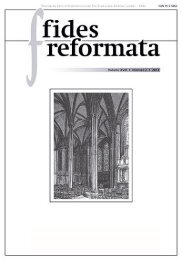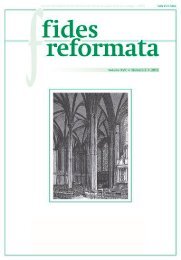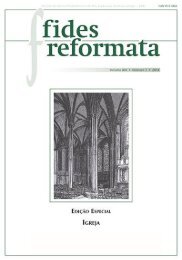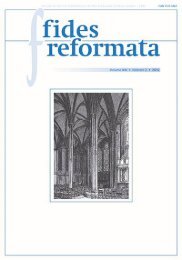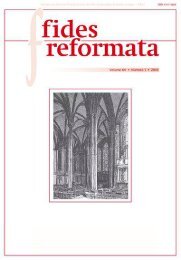Create successful ePaper yourself
Turn your PDF publications into a flip-book with our unique Google optimized e-Paper software.
Breno Mace<strong>do</strong>, Covenant Theology in the Thought of John Calvin<br />
promise. 67 The administration of the sign of the covenant in babies <strong>do</strong>es not<br />
guarantee their salvation. Calvin makes a strong case against the false belief<br />
that those infants who die before the opportunity of being baptized are <strong>do</strong>omed<br />
to perdition. The sign, according to Calvin, shall not overpower the promise of<br />
God. 68 However, the reformer raises a strong case against those who willingly<br />
hinder their children from receiving the sign of the sacrament. Calvin affirms<br />
it to be a demonstration of ingratitude and contempt for the grace of God. The<br />
willful rejection of the sign God himself established as part of his covenant<br />
must be avoided at all costs on the threat of one’s suffering God’s divine punishment.<br />
69 In the Institutes, Calvin emphasizes five different practical aspects<br />
of the Abrahamic covenant regarding membership in it and the spiritual profit of<br />
its members from it. They are, according to Peter Lillback: (1) this covenant is<br />
the means by which God separates believers and non-believers in the world;<br />
(2) it is where Israel, the natural descendants of Abraham, finds salvation;<br />
(3) this covenant continues to be valid until today; (4) Christ is center of this<br />
dispensation; (5) justification and sanctification are its two great benefits. 70<br />
conclusion<br />
Although Calvin was not concerned to leave behind him a systematic<br />
approach to the <strong>do</strong>ctrine of the divine covenants, it is clear that not only was<br />
his mind immersed in this precious <strong>do</strong>ctrine but that a careful, logical, and<br />
systematical approach to his writings enables one to extract and organize,<br />
in systematic form, his thoughts. Calvin was not too far from the other scholars<br />
after him who developed <strong>do</strong>gmatics having the covenant as their central<br />
structural principle. Such a harmony between Calvin and later theologians<br />
demonstrates what takes place when the Sola Scriptura is taken seriously:<br />
harmony in the midst of diversity. In spite of diverging in non-essentials like<br />
specific terminology, the theologians of the reformation and post-reformation<br />
periods believed in general in the same <strong>do</strong>gmas. The Church <strong>do</strong>es well in<br />
keeping and studying their teachings.<br />
67 “For the covenant of God was graven on the bodies of the males, with this condition annexed,<br />
that the females also should as their associates be partakers of the same sign” Calvin, Commentaries on<br />
Genesis, 1:453.<br />
68 “To consign to destruction those infants whom a sudden death has not allowed to be presented<br />
for baptism, before any neglect of parents could intervene, is a cruelty originating in superstition. But<br />
that the promise belongs to such children, is nothing the least <strong>do</strong>ubtful. For what can be more absurd<br />
than that the symbol, which is added for the sake of confirming the promise, should really enervate its<br />
force?” Calvin, Commentaries on Genesis, 1:458.<br />
69 “But because it is not in the power of man to sever what God has joined together; no one could<br />
despise or neglect the sign, without both rejecting the word itself, and depriving himself of the benefit<br />
therein offered. And therefore the Lord punished bare neglect with such severity.” Calvin, Commentaries<br />
on Genesis, 1:457-458.<br />
70 Lillback, The Binding of God, 145-146.<br />
104






